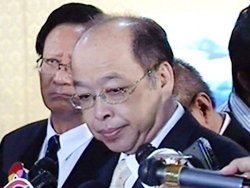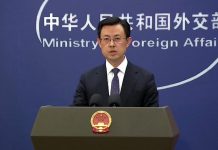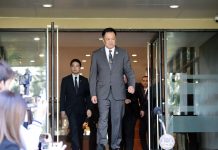BANGKOK, Sept 1 – Thai Foreign Minister Surapong Towichakchaikul said on Friday he would visit Cambodia on Sept 14, as part of his introductory trip among the members countries of the Association of Southeast Asian Nations (ASEAN), and at the same time will seek additional information on the alleged secret talks on overlapping oil and gas-rich maritime area between the previous Thai government and Cambodia.
The foreign minister said he planned to visit the other nine members of the Association of Southeast Asian Nations (ASEAN) in alphabetical order, beginning with Brunei.
Mr Surapong said he will visit Cambodia on September 14 and he will seek the opportunity to help secure the release of two activists of Thailand’s Patriot Network, Veera Somkwamkid and Ratree Pipattanapaiboon, now being detained in a Cambodian jail for illegal entry and spying charges.

Regarding the allegation of the Cambodian National Petroleum Authority (CNPA) that secret meetings between former deputy prime minister Suthep Thaugsuban and his Cambodian counterpart Sok An were held several times to deal with overlapping claims to the offshore area believed to be rich in oil and gas reserves, Mr Surapong said Prime Minister Yingluck Shinawatra has assigned him to look into the case.
The foreign minister urged Mr Suthep to come clean to the public as the meetings were allegedly held secretly without acknowledgement of the Thai foreign ministry and other concerned officials.
“I will send a letter to Cambodia seeking more details on that and will inform the public if any evidence or facts are established,” Mr Surapong said, assuring the public that there is no hidden agenda over the Cambodian move as Phnom Penh has affirmed that it wants to improve its relations with Thailand.
“In the statement, Cambodia insists it needs to disclose the information as Mr Suthep had been assigned by Mr Abhisit to discuss the matter secretly several times and the Thai public may be curious about it,” Mr Surapong said.
“I also doubt why the Memorandum of Understanding (MoU) on the maritime conflict of interest was cancelled by a Thai cabinet resolution on Nov 10, 2009, but not made official, and then a year later Mr Suthep was re-appointed to chair a committee on the matter,” he added.
The Cambodian statement said that meetings between high ranking officials including Prime Minister Hun Sen, Deputy Minister Sok An, former Thai deputy prime minister Suthep and former defence minister Gen Prawit Wongsuwan took place in June 2009 and July 2010 in various locations including Cambodia’s Kandal province, China’s Kunming city in Yunnan, and Hong Kong.
The statement claimed Mr Suthep at the time “indicated a strong preference to resolve this issue during the mandate of the Abhisit government.”
As Mr Abhisit earlier accused deposed premier Thaksin Shinawara of having secret interests with Cambodia, the CNPA statement said it needs to reveal the truth “to protect the interests of Cambodia and H.E. Thaksin Shinawatra against baseless allegations made on part of the Democrats.”
Meanwhile, former Thai prime minister and the opposition Democrat Party leader Abhisit Vejjajiva explained that he assigned Mr Suthep to oversee the matter as talks between the sides were needed to fine-tune some information before bringing the case to Parliament. All moves however were suspended after Phnom Penh appointed the fugitive ex-premier Thaksin as its adviser.
Mr Suthep has clearly clarified the issue and there was nothing unusual, Mr Abhisit said, “If there was something wrong, why did we have to suspend the 2001 MoU?”
Mr Abhisit also commented that the statement of Cambodian government casting his government in a bad light is clear in itself that his government had no vested interests with the neighbouring country.
The Democrat leader added the foreign ministry advised him to put the 2001 MoU on hold as it affects the maritime demarcation. He urged the public to closely monitor the cooperation between Cambodian government and the current Thai government, which he says is preferred by Phnom Penh.




